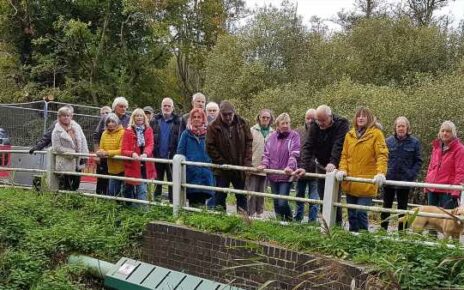Save articles for later
Add articles to your saved list and come back to them any time.
A Sydney council is vowing to protect “residents only” street parking at one of the city’s top tourist spots ahead of a bumper summer despite being warned the practice is unlawful and one councillor condemning the privatisation of public roads.
Woollahra Council in the eastern suburbs will seek a second legal opinion from a senior counsel after its go-to external lawyer advised the scheme at Watsons Bay was probably breaking NSW rules by creating “exclusive parking areas”.
Watsons Bay is one of Sydney’s most popular tourist destinations, and Camp Cove Beach is routinely packed in summer.Credit: Brook Mitchell
Several of the narrow streets near Camp Cove Beach, which is notoriously busy in summer, are marked as “no parking – permit holders excepted”. It means an estimated 70 on-street parking spaces are exclusively reserved for residents – some of whom have carports, but not all.
Camp Cove, like Redleaf Beach in Double Bay, will face extra congestion this summer because of the ongoing closure of nearby Shark Beach/Nielsen Park, where the seawall is being rebuilt. Forecasters are also predicting a warmer than average beach season.
The council’s traffic committee, consisting of council staff and representatives of NSW Police and Transport for NSW, last month recommended changing the arrangements to allow visitors to park for two hours (with permit holders excepted).
But following a backlash from locals, who packed public galleries at recent meetings, elected councillors have vowed to protect residents’ exclusive parking, even if by stealth.
Cliff Street is one of several streets in the precinct that has parking reserved exclusively for residents, which would be replaced with two-hour zones.Credit: Brook Mitchell
“My belief is we do everything in our power to listen to the residents and deliver on their needs,” said outgoing Liberal Mayor Susan Wynne. “This area is very unique. There is no other area within Woollahra that has to deal with the challenges that it deals with. It’s one way in, one way out.”
Councillors voted on Monday night to defer the matter and obtain further “external independent legal advice from senior counsel, unclouded by the recommendation in the staff report and legal advice already given”.
The senior counsel will be asked to assess whether the council is obliged to abolish the exclusive permits, whether there are any loopholes given the “historic nature of the precinct”, and the legal risk of maintaining the current system.
Residents First councillor Harriet Price was the only official who voted against that plan of action and advocated opening the streets to visitors.
Camp Cove, pictured in November 2022, has become even more popular due to the closure of Nielsen Park in nearby Vaucluse.Credit: Edwina Pickles
“Our public spaces are there to be shared and enjoyed by all. Privatising a public road is not the way to go, and we do not need a second legal opinion to tell us that,” she said.
“We have legal advice before us that we have spent some $20,000 obtaining, which in my view is unequivocal. I find it extraordinary that we would be spending further ratepayers’ money to get a result that is not necessarily the correct one.”
Legal advice tabled at Monday’s meeting, dated September 7, from the council’s long-term external adviser Lindsay Taylor found the existing scheme was “unlawful to the extent that parking permits are issued for vehicular parking in areas where parking is otherwise prohibited so as to establish those areas as an exclusive parking areas” [sic].
That was because guidelines issued by Transport for NSW declare: “In NSW, there are no areas set aside exclusively for permit parking.”
Greens councillor Nicola Grieve said if further legal advice confirmed the system was unlawful, the council should change the signage to allow 15-minute parking with an exception for residents.
“If it’s an hour or two hours, I’m going to risk parking there and staying longer,” she said. “But if it’s 15 minutes, I’m not going to risk it, because I’m going to figure there’s going to be too much [risk] I will get caught.”
Wynne said that sounded like an “excellent” idea if necessary, but “we’re all hoping that our legal advice supports [the] status quo”.
According to a submission by the Watsons Bay Association’s Andrew Maloney, the current parking system has been in place since 1975. He said residents enjoyed sharing the beauty of Watsons Bay with its visitors, and recognised this was “an inherent part of living in the area”.
However, providing more parking spaces would only encourage more motorists to visit what was already “the most visited location in Sydney after the Sydney Opera House”, Maloney wrote. And unlike other parts of the city, residents had to travel long distances to access basic shops and services.
“Parking on a typical day in Paddington or Surry Hills might require some searching and a 100-metre or even a 200-metre walk,” he wrote. “At Watsons Bay, the likely parking is 1.2 kilometres away in lower Vaucluse.”
The Morning Edition newsletter is our guide to the day’s most important and interesting stories, analysis and insights. Sign up here.
Most Viewed in National
From our partners
Source: Read Full Article





